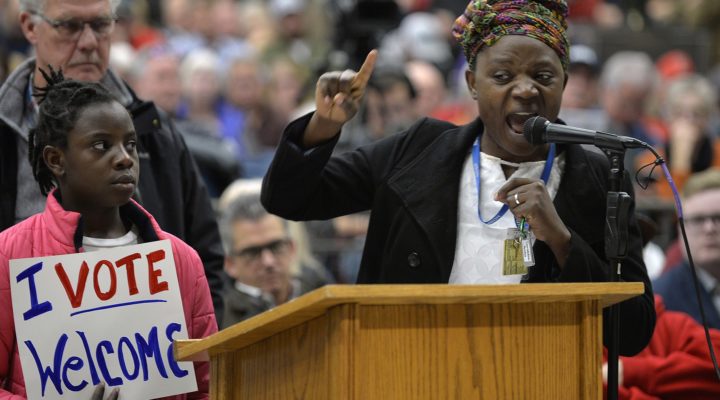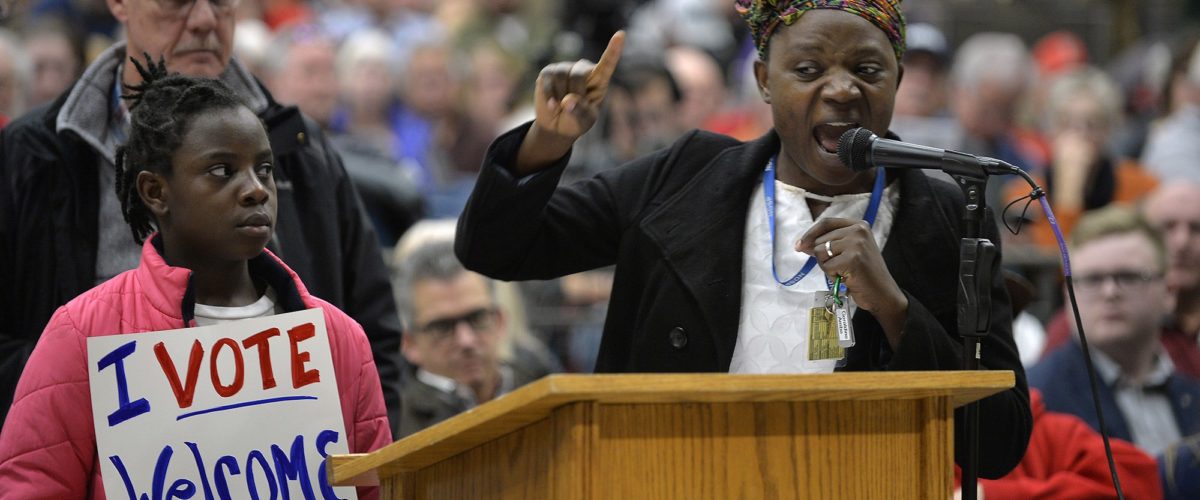Among the African community, mixed reactions have continued to trail debate in the United States Congress of the Build Back Better bill. The concern is about a lesser-noticed provision about immigration.
Reports show that $100 billion is earmarked for immigration reform in the bill, with a plan to assist certain categories of undocumented immigrants in the U.S. to acquire work permits. Those favored to benefit from the plan are immigrants who arrived in the U.S. before 2011 but lack legal permits to work.
The fear is that Congressional endorsement of the bill will end or put on hold the initial plan by House Democrats to include in the bill, through budget reconciliation, a pathway to citizenship for millions of undocumented immigrants in the country estimated to be more than 11 million.
This was a key part of President Joe Biden’s electoral promise during the 2020 presidential race. Biden hoped to become the second leader, since Ronald Reagan in 1986, to grant amnesty to undocumented immigrants in the country. As a result, not a few hopes were raised among the immigrant community in the U.S., comprising people of different nationalities.
Since becoming president, however, Biden’s plan has failed to make headway in a closely divided Congress.
Since becoming president, however, Biden’s plan has failed to make headway in a closely divided Congress. Efforts by Democrats to include it in a draft proposal to the Senate were rejected by the Senate parliamentarian, Elizabeth MacDonough.
Plan C
What eventually scaled the hurdle was the least of the proposals, called “Plan C,” which, unlike Biden’s original plan, is limited to securing work permits and no pathway to citizenship. In rejecting the first two proposals, MacDonough described the series of proposed amendments to the Immigration and Nationality Act as a major policy change that “substantially outweighs the budgetary impact of that change.”
Now, many Africans who initially were happy about Biden’s promise and hopeful for better days but do not fall under the category of people to be favored in Plan C, are ruing their fate. One of them, a Nigerian based in Houston who arrived in the U.S. six years ago, told BNG that the outcome was disappointing to him as he had long hinged his hopes on Biden’s promise.
“This wasn’t what they promised. What I heard Biden promise was citizenship.”
“I’m not happy. This wasn’t what they promised. What I heard Biden promise was citizenship. Then suddenly, it’s over. It’s sad,” said the man who asked that his identity be protected because of his precarious situation.
Another African also described the outcome as “unexpected and painful.” The end result, he said, only showed that “politicians are not people to be trusted.”
These views represent the sentiment of Africans across the U.S. about passage of the bill. Like many other continents, Africa has its share of undocumented immigrants in the U.S., many of whom arrived in the country in search of a better life. According to the Migration Policy Institute, there are an estimated 295,000 unauthorized African people living in the U.S. The majority of unauthorized immigrants, however, come from Mexico, Central America and South America, the Caribbean, Europe and Asia.
Earning a living the hard way
Many undocumented immigrants, in their bid to survive, end up working all manner of odd jobs or earning a living the hard way. In the process, some complain of being taken advantage of by employers. This was what the Nigerian quoted above looked forward to escaping through Biden’s promised amnesty.
“With a work permit, I would be able to find a better job and escape the discrimination and racism I experience in my workplace,” he said. “And I would be able to contribute more to the American economy by paying taxes and having a sense of belonging. These are things that had long occupied my mind and which I thought was about to change until the turnaround.”
“With a work permit, I would be able to find better job and escape the discrimination and racism I experience in my workplace.”
A 2018 report by the New American Economy quoting the U.S Census Bureau on African migration to the U.S., (which includes both legal and undocumented immigrants) states that “more than three out of every four African immigrants above the age of 16 are active in the labor force — meaning, they are either working or actively seeking work. In other words, African immigrants are much more likely to be contributing to the U.S. workforce than they are to be disabled, sick or still in school. The labor force participation rate of African immigrants is much higher than that of both the U.S.-born population (62.6%) and the overall foreign-born population (66%). It is also higher than other immigrant groups, including both Asian and Hispanic immigrants.”
The plight of Cameroonians
Before the current version of the Build Back Better Act, however, some Cameroonians in the U.S. had called on the Biden administration to grant them temporary immunity and halt the deportation of their citizens to Cameroon, a practice that they said had been ongoing since Donald Trump’s administration.
In an article published last month, Lynn Tramonte of the Interfaith Immigration Coalition said that “Trump administration ICE officials used pepper spray, choke holds, the WRAP torture device, and other forms of violence to forcibly deport Cameroonian, Congolese and other African refugees to countries they fled,” and that “the Biden administration continues to carry out Trump’s policy, sending people to death, torture and indefinite detention — instead of using its executive authority to protect them in the United States.”
The clamor by Cameroonians for presidential immunity came days after more than 200 organizations comprising human rights, labor, humanitarian, social and racial justice groups sent a letter to Biden asking that he grant U.S.-based Cameroonians Temporary Protected Status or Deferred Enforced Departure to shield them from discrimination or deportation.
“Deporting people to unsafe conditions and the hands of their persecutors is cruel and deadly.”
Cameroon, in the past couple of years, has been embroiled in a conflict involving secessionist fighters from the southern part of the country wanting to break away from the bilingual country. This occasionally has led to clashes with government forces, leading to death and destruction and forced displacement of people from the Central African country. For this reason, many Cameroonians and groups like Cameroon Advocacy Network feel it is unfair to return people there.
“Deporting people to unsafe conditions and the hands of their persecutors is cruel and deadly. It cannot be justified by any administration, much less one that claims to value human dignity and wants to ‘build back better,’” said Daniel Tse with CAN. “Cameroonians feel that nowhere is safe for them to turn, and that fear is truly unlivable.
“People who once led full, comfortable lives are now like walking ghosts, the threat of deportation always over their heads. But we also know our rights and our value as members of the human family. Ending deportations to Cameroon and designating the country for Temporary Protected Status are two urgent, reasonable steps the Biden administration [should] take today to prioritize the restoration of dignity and protection of Black migrants,” he said.
More was expected
Reacting to the current version of the Build Back Better Act, Yasin Kakande, a U.S.-based journalist and migration expert, said while the gesture is a good one, a lot more was expected.

Yasin Kakande
“It’s certainly better than nothing to give long-settled immigrants a chance to work legally and live without fear of deportation in the United States, but for policy makers especially the Democrats that have marketed themselves as pro-immigration reformers and advocated an overhaul of the broken immigration system, this is not enough,” he said.
Although migration remains a divisive subject in the U.S., with many in support of or against the idea of helping immigrants legally settle in the country, Kakande says undocumented immigrants are a strong pillar of the U.S. economy today.
“Throughout the COVID-19 pandemic, undocumented workers have been on the frontlines as essential workers in nursing homes, hospitals, grocery stores and industries,” he said. “Essential home and nursing-care-based services for patients who are among the most vulnerable to the virus are made possible largely through the cumulative efforts of immigrants and refugees who have come to the U.S. Our political leaders would be wise to acknowledge this and afford the required legalizations for immigrants who are already here to work without fears of punitive actions or deportation.”
At the moment, while many of the immigrants amazed at the turn of events have given up hope on President Biden’s amnesty promise, some others, like one of them put it, simply “watch and pray,” in the hope that something good could still come out from the expected final blueprint of Build Back Better.
Anthony Akaeze is a Nigerian-born freelance journalist who currently lives in Houston. He covers Africa for BNG.
Related articles:
Biden administration rushing to strengthen DACA, official says
Dreamers left with disappointment once again as Senate parliamentarian dashes their hopes


